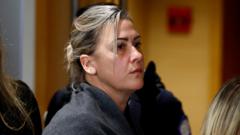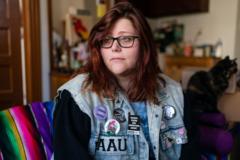The recent conviction of Dominique Pelicot and 50 other men in a landmark trial for the mass rape of his wife, Gisèle Pelicot, has sparked an outpouring of support for the feminist icon. However, for their daughter, Caroline Darian, the moment was marred by personal despair and unanswered questions regarding her own traumatic experiences.
“They didn’t even consider my case,” said Darian, who recounts the heavy toll the trial took on her psyche, as she felt overshadowed by her mother’s widely publicized struggle. In a recent conversation at a Parisian café, she openly expressed her feelings of abandonment, reflecting on the lack of acknowledgment for her claims that her father drugged and raped her over the years.
Despite the gravity of the case that led to the convictions of 51 men, including her father, Darian remarked, “Dominique was not tried for what he did to his daughter.” The intense scrutiny and detail explored in the court proceedings revolved largely around the torment inflicted on Gisèle Pelicot, who bravely faced her abuser and the system that often silences victims.
The trial, which captured the attention of the French public, illustrated the decades of horrific abuse Gisèle endured at the hands of her husband, who mixed substances into her food and drink, enabling strangers to exploit her vulnerability under his command. Yet, Caroline’s own reality remained largely unacknowledged, leaving her with feelings of isolation.
As the crowd celebrated outside the courthouse, chanting in support of her mother and acknowledging the impact of their collective struggle, Darian felt painfully disconnected from the victorious moment, immersed instead in her grief and the uncertainty of her personal truth.
“I came away feeling more wounded than I can express. There was no closure for me,” she added, calling attention to the systemic failures that often negate the voices of those who parallel the victims in narratives of abuse.
In attempting to navigate her internal battle, Darian continues to fight for recognition and resolution. She refers to the ongoing journey of healing and insists on the importance of voicing her pain, urging society to confront not only the stories of well-known survivors but also those who remain unheard.




















